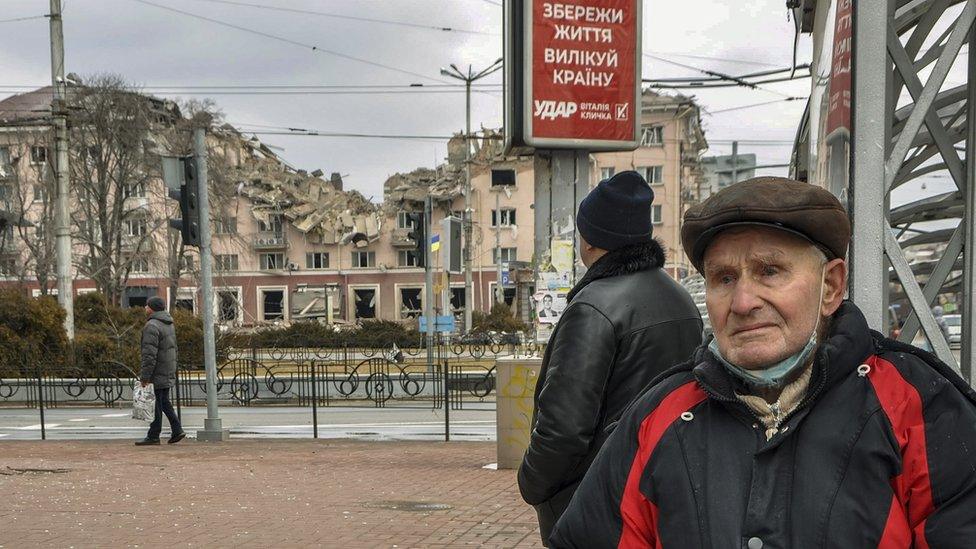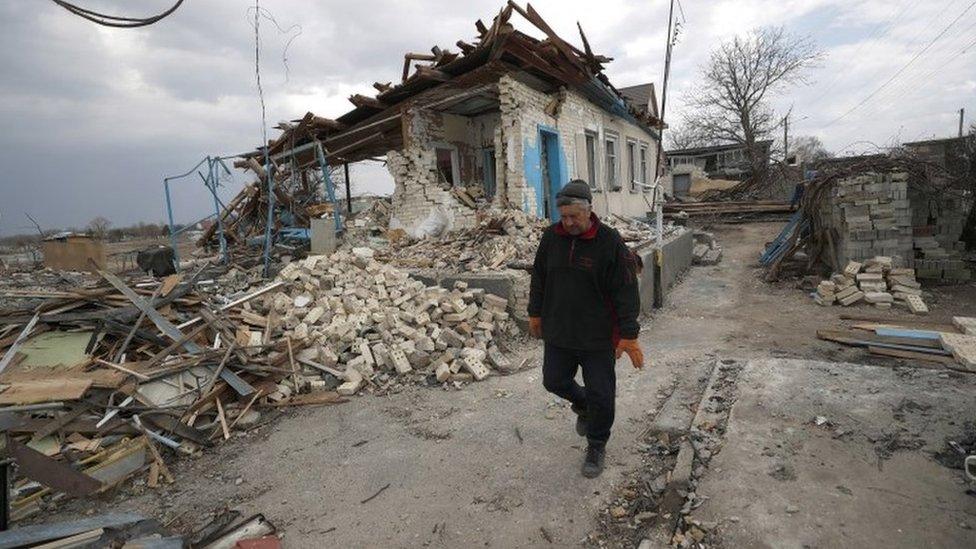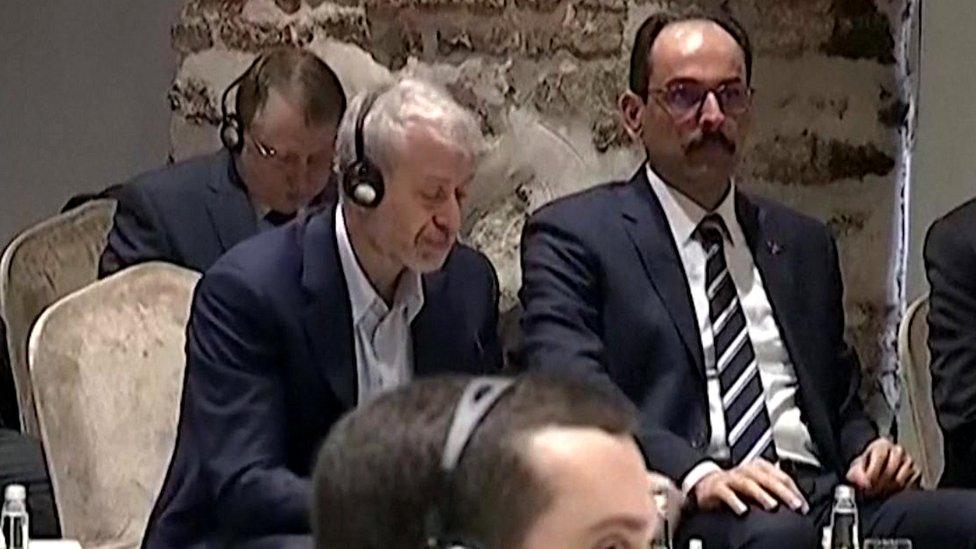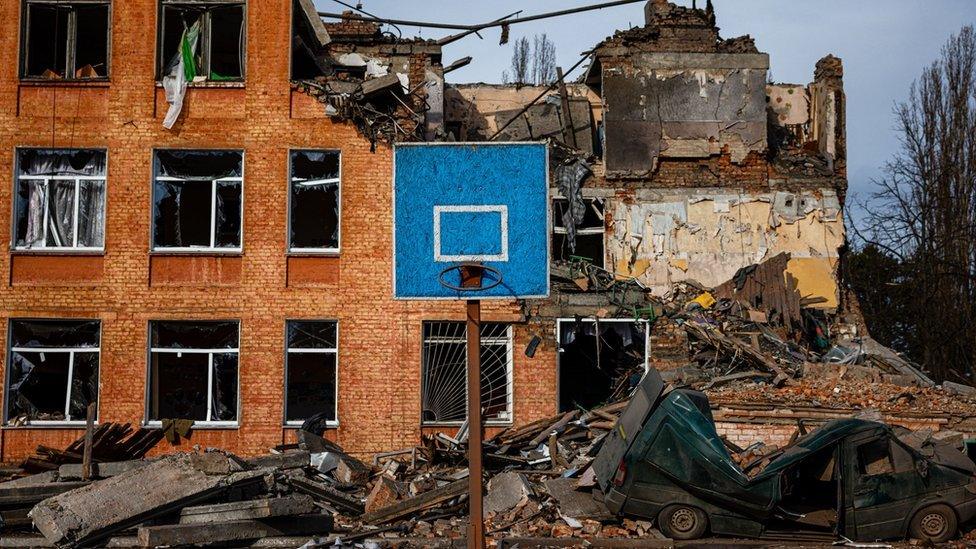Ukraine war: Russia says it will curb Kyiv assault as peace talks progress
- Published

Moscow also pledged to curtail the assault on Chernihiv, which has been encircled by Russian forces
Russia has announced it will "drastically reduce" military combat operations in two key areas of Ukraine "to boost mutual trust" in peace talks.
The decision to scale back operations around the capital, Kyiv, and the northern city of Chernihiv is the first sign of tangible progress from talks.
But it is unclear how extensive any reduction in military activity might be, and Ukraine remains sceptical.
The US and UK also said the pledge should be treated with caution.
On Tuesday, Russia's deputy defence minister, Alexander Fomin, said the country would "radically, by several times reduce the military activity" around Kyiv and Chernihiv.
He added that there had been progress on "the neutrality and non-nuclear status" of Ukraine, which are two key concerns for Moscow.
But Russia's pledge to scale back its forces was met with scepticism. "Ukrainians are not naive people," President Volodymyr Zelensky said in an overnight video address.
"We can say that the signals... are positive, but those signals do not drown out the explosions or Russian shells," he added.
"We've only seen a small number begin to move away from Kyiv," Pentagon spokesman John Kirby said, adding that people should be "prepared to watch for a major offensive against other areas of Ukraine".
The UK Defence Ministry also warned that Russia will likely "seek to divert combat power from the north to their offensive in the Donetsk and Luhansk regions in the east".
Russia has already refocused its campaign on Ukraine's eastern regions. It has suffered a series of setbacks to the north of the capital, Kyiv, and is also seeking to capture a land corridor which stretches along the south coast to the Russian border.

The key word - scepticism

The discussions lasted about three hours. Very little was leaked and nearly all media were kept away, in a packed area on a pavement.
The key points became clear as members of the Ukrainian delegation came out onto the street an hour before the expected finish.
The negotiators said they had proposed to Russia that Ukraine adopt a neutral status in exchange for security guarantees - an international mechanism where guarantor countries would act to protect Ukraine in future.
In return Kyiv would not join Nato, a key Russian demand. This was not a new pledge, but it was spelt out in the clearest detail yet.
Many are sceptical about what Russia's announcement about reducing military operations actually means; whether it's a pledge to pull back or merely an acceptance it has already failed in those areas and will instead turn its full force further east.
Western countries, therefore, are saying they will judge Russia by its actions and not its words.

During the ceasefire talks on Tuesday, Ukraine proposed to become a neutral state in exchange for security guarantees. A key aim of Russia's invasion was to stop Ukraine joining the Nato alliance and Russian officials said the talks had moved to a practical stage.
Ukrainian negotiator Oleksandr Chaly told reporters that its offer of neutrality - which means it would not ally itself militarily with others - was a chance to "restore the territorial integrity and security of Ukraine through diplomatic and political means".
Russian forces have encircled Chernihiv, where officials say up to 400 people have been killed and some 130,000 residents are without heating, electricity or water supplies.
Russia's chief negotiator, Vladimir Medinsky, said talks had been "meaningful" and Ukraine's proposals on neutrality would be put to President Vladimir Putin. However, he made clear that before a presidential summit could happen a treaty would have to be drafted and approved by negotiators, and then signed by foreign ministers.
"This is not a ceasefire but this is our aspiration, gradually to reach a de-escalation of the conflict at least on these fronts," Mr Medinsky told Russian state news agency Tass.

War in Ukraine: More coverage

Ukraine's negotiators in Istanbul handed the Russians detailed proposals, external covering neutrality and other core issues in the conflict:
Ukraine would become a "non-bloc and non-nuclear" state, with no foreign military bases or contingents on its territory
This would have strict, legally binding guarantees from countries including the UK, China, the USA, Turkey, France, Canada, Italy, Poland and Israel which would agree to protect a neutral Ukraine in the event of attack
Ukraine would not enter military-political alliances and any international exercises would require consent of guarantor states
The future status of Crimea, seized by Russia in 2014, would be decided by 15 years of consultations
The future of the eastern areas held by Russian-backed separatists would be discussed by the two presidents.
Ukrainian negotiator David Arakhamia said this framework would enable a ceasefire to be agreed without Crimea and the eastern regions being settled.
The proposals would also enable Ukraine to join the European Union, while barring it from becoming part of Nato's defensive military alliance.
- Published26 March 2022

- Published29 March 2022

- Published28 March 2022
